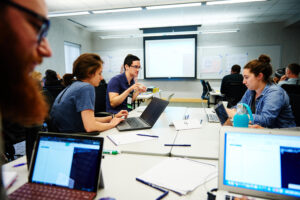Starting an Observation Club
 Starting an Observation Club
Starting an Observation Club
2014 Knowles Teaching Fellow Nicholas Chan, Knowles Senior Fellow Katie Waddle, and 2014 Knowles Teaching Fellow Kayla Urquidi sought to increase alignment between the mathematics and science teachers at their school—San Francisco International High School in San Francisco, California. Specifically, they aimed to get the four mathematics teachers and three science teachers to discuss classroom practices such as assessment, student discourse and differentiation. To lay the foundation for this important effort, they were awarded a Knowles grant to fund attendance at the California Mathematics Council North 2015 Conference for four teachers from their school. Conference attendance helped group members develop common language around sharing best practices, protocols, and norms, which proved useful as they moved into the second part of this effort—starting an observation club. From January through May 2016, members of the group observed one another teaching in their classrooms on multiple occasions and met four times to discuss their observations. “Before the observation club, I would get into other math and science classrooms maybe once or twice a year,” said one member. “Now I’m and in and out of them almost weekly.” Through the observation club, the mathematics and science teachers at the school were able to start and sustain conversations about structures and strategies that worked in their classrooms, as well as structures and strategies that could work at the grade or department level. Club members were also able to explore areas of their own teaching practice through inquiry and feedback from peer observations. In total, 300 students that year were impacted by their efforts to improve alignment amongst the mathematics and science teachers at the school. Members of the club also generated a number of tools that helped them to better observe each other by allowing them to record observations and track a wide range of data. The club, which is still operational, focuses on discussing how to interrupt issues of status in member classrooms and how to promote equity in STEM fields within the safe community that its members have created.